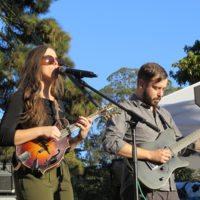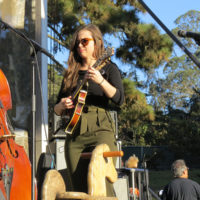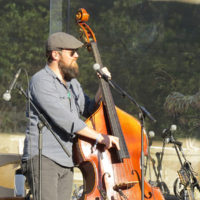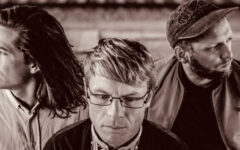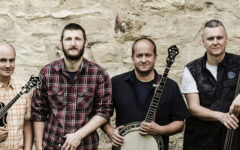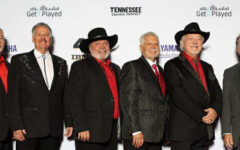
Sierra Hull at Hardly Strictly Bluegrass 2019 – photo by Dave Berry
Sierra Dawn Hull needs no introduction to bluegrass fans. Winner of multiple IBMA awards and having played the Grand Ole Opry, Carnegie Hall, and the White House before turning twenty, she has opened doors most could only dream of, and she’s just getting started. Her latest release, Weighted Mind, with a more singer-songwriter focus, not unlike the work of mentor Alison Krauss, sees her expanding and exploring new areas for her remarkable mandolin and vocal talents.
She and her management, Chris Harris of Rainmaker Music Management, couldn’t have been more accommodating for her interview at the nineteenth annual Hardly Strictly Bluegrass (HSBG) festival in San Francisco. When we met at a Banjo Stage picnic table in Hellman Hollow, she immediately opened up with smiles and hospitality as if we were sitting in her Tennessee living room sipping iced tea. Of course, she answered every question in-depth and with candor in her stream-of-consciousness, animated fashion. We discussed her latest release with producer Béla Fleck, meeting Chris Thile and Alison Krauss on the same day, how it feels to be looked up to by the next generation of young pickers, and much more.
Okay, I’m here at Hardly Strictly Bluegrass ’19 with Sierra Hall. How are you doing Sierra?
Hey, I’m good. How about you?
Wonderful. How is your family doing?
They’re doing good. Yeah, I’m very much due for a visit home. I’ve been touring so much. It’s been hard to get home, but I was just FaceTiming with Mom this morning. So yeah good. Yeah. I’ll say well.
Nice. I saw a recent interview where you said you were getting emotional watching the PBS Ken Burns Country Music film. I’m glad you mentioned that because I think a lot of us were tearing up watching that.
Oh, yeah. Absolutely. I mean, it’s so beautifully done and the way he knows how to take images of these people that you know there aren’t any videos of. It’s not like you can just get on YouTube and see these important figures and the history of the music that we love. So to actually see these photos in the stories in there, it’s like they become… they become real, you know in a way that if you just see a photo of somebody, it just sort of seems like this, you know, a person from another time… but to have it in the context of the documentary’s just been so powerful. These were just real people like you and I – and thank God they were – that we now get to all love, you know country music and bluegrass music, and all these different things.
You were at the IBMA World of Bluegrass event last week and among other things, participated in that all-star tribute to Del McCoury. Tell us a little bit about that.
Well, I mean, honestly, I love Del so much. He’s been such a hero of mine since I was a little kid, and I’ve been lucky enough to get to play a lot with him over the past five or six years. That whole family, they really feel like family to me at this point because I’ve been able to just spend so much time with, you know, different things, like getting to sit in on a show like that one or spend a lot of time at DelFest, the festival they do up in Cumberland, Maryland. Honestly, they just don’t come any better than the McCourys. They’re just so talented and, I mean the whole band is just, still to this day, one of my favorite bluegrass bands ever, and on top of that they’re just such good and wonderful people.
Del just embodies a love for the music that’s so infectious. You know, to be eighty years old and be able to stand up there for, you know, this three-hour set basically and just kill it is so inspiring. I hope I can still do that when I’m seventy, let alone eighty.
I recently saw a video of you playing backstage with Dawg, Mike Marshall, and Frank Solivan with Del looking on. It’s great as fans to see you all having so much fun backstage.
Yeah, that was at Pickin’ in the Pines in Arizona. Oh my gosh, I know. I got cracked up when I watched it later with my friend Geoff Saunders, the bass player in my band who took that video. He sent it to me and we just died laughing when it pans over to Del because, you know, he doesn’t know the cameras rolling. He’s just sitting there watching music but he’s got that smile on his face and he always does that, that’s so typical Del, on and off stage. He’s still that same person which is really a beautiful thing.
It seems a lot of the people in this music are like that. Their stage persona is pretty much the same as you and I talking here.
Yeah, I think that’s the goal, you know, to try to put on an authentic performance that is reflective of who we are as human beings. I mean, obviously, there’s always a little element of you standing on stage in front of people and you sort of go into performer mode, which I think is natural. I do think the goal is to try to give the truest bit of yourself that you can to the audience, and in an honest way.
You work at music camps with some of these same folks don’t you?
Yeah, I’ve done a fair amount of teaching this year. It’s not something I’m necessarily seeking out or trying to do, but there have been some really cool opportunities that have come up just this year. I was lucky enough to be part of the Mandolin Symposium that used to happen in Santa Cruz, you know, Dave Grisman and Mike Marshall’s camp. I got to teach at, I think one of the last ones and then, of course, they quit doing that but I just loved it. It was such an inspiring experience just to be around, you know, such great instructors and the cool thing about this campus is that they’re not just bluegrass music focus. They have all kinds of different things from jazz to classical to blues to Brazilian music, so there’s this wide range of mandolin music that happens. Mike’s Mandolin Summit Camp this year was basically very much in line with the Mandolin Symposium in the approach of having it be a really well rounded camp. I was thrilled to just get to be there and get to experience being around my heroes.
Let’s talk about your latest release, Weighted Mind, produced by Béla Fleck. Tell us what that was like and how he helped you to get what you wanted.
Yes. Oh, Béla has been a hero of mine, you know for as long as I can remember from his solo albums, early on from the early Rounder days to playing on records for Tony Rice and people like that, but they’ve always been big heroes to me. I’ve always loved his playing and his music but kind of just stumbled into this opportunity to work with him. I started working on the record then decided to kind of change gears a little bit. I recorded half a project and then took a step back from it and decided to take on a producer. Alison Krauss has been a longtime friend and mentor to me, and she and I were talking about different ideas of, you know, potentially bringing on a producer and she mentioned Béla’s name. I hadn’t thought about him as a producer for this. Well for one, he doesn’t produce very many projects. He had produced in the past but hadn’t really done anything in years other than producing his own records. Also, this was going to be a singer-songwriter style album more than an instrumental driven thing. But she was very much like, I think he will be a great vocal producer too, and you know, just such a well-rounded musician that I think he’ll understand what you’re trying to accomplish, and she couldn’t have been more right. It was just so inspiring to work with him.
I feel like, you know, I’ve been trying to figure out what I needed to do and had all these different ideas, and I feel like when I started working with him, finally it was like, oh he gets me, he gets what I’m trying to… what I’m trying to accomplish. He pointed me in some directions that I might not have had the confidence to do on my own, kind of encouraged me to start playing solo a little bit and working on my music with just mandolin and voice, which I had never done before. I’d always, you know played in a bluegrass ensemble and always been surrounded by a band, so if I wrote or presented music, it was always kind of with that in mind. But the idea of having to change the way that you think about playing your instrument and the way you sing to make something interesting from start to finish on a song, it was a different kind of challenge than what I had done on any of my previous albums.
So yeah, I think he helped me understand more about myself and who I am as an artist if there’s nothing left but me. I love the spirit of collaboration, sitting and playing with other musicians. So if I’d be working on a new song or, you know, working on something to do with the band, it would be so easy for me to go, oh, I want to hear what this person has and dedicate all this space to other people and sort of leave a little less room for myself. So he just pointed out that it would be really cool for me to think about presenting myself in this really stripped-down fashion. It was just such a good experience to get to work on that and I feel like I grew a lot as a result.
Yea, though it was clear, last night’s show on the Porch Stage was a strong group ensemble collaboration of the material.
Yeah, I mean, that’s part of the beauty I think of playing in a band ensemble. The goal is to surround yourself with musicians that are inspiring. So, you know, I love getting to play with those guys that I played with yesterday.
There’s always tension when a traditional artist moves in other directions. You were doing that before you connected with Béla though right?
I think I was moving in that direction anyway, and Béla definitely helped me somewhat solidify and maybe get there quicker than I would have gotten there on my own. You know, he gave me the boost of confidence, I guess, so to speak, to just go for what it was that I had kind of been longing to do all alone. I think as a result of that I’m starting to build a band ensemble from a new corner than I would have before because of growing up in the bluegrass world, which of course I still love. I think it’s one of the greatest sounding ensembles you can have, the traditional bluegrass ensemble. All the instruments just work together perfectly, but it’s also been interesting to kind of not feel confined to any particular thing. The Weighted Mind album kind of helped me be able to strip everything away. Now if I add things back in, I feel a lot more free about what that looks like and what that means.
Also trying to choose musicians that inspire me rather than thinking that they have to be a banjo player or they have to be a, you know, a fiddle player. It’s like, is your musicianship inspiring and does it seem like you have the sensibilities that will make sense and reflect the music I’m trying to make?
Well, most all of the greats move on at some point in their careers to other styles but they usually come back in some form, because that music is always with you.
Well you know, my husband and I have been playing more and more together as a duo which gives us both an opportunity. He does a lot of things on his collaborations with a lot of different bands and we’ve had an opportunity to kind of go back to some of our more bluegrass roots through doing a show covering people like Ralph Stanley or Larry Sparks, things that we don’t necessarily do in our other configurations. We definitely do some progressive stuff too but it’s always fun. I think to take a break from something for a little while that you know, what is it they say, I like pizza, but maybe I don’t want to have pizza every night for dinner for two years straight. Bluegrass is always going to be home for me. I mean no matter what, that’s where I come from. That’s the music that I feel like is home base for everything. I happen to love a lot of other things and I’m excited to have the freedom to explore them. I think it will only help me grow as a musician but you know, I have no doubt that I will be playing bluegrass for the rest of my life in some form or another.
You and Sarah Jarosz are inspirations for many young ladies who play mandolin. Did you ever imagine that you would have this huge impact?
You know, and it’s still hard for me to imagine it really. Because I remember it doesn’t feel like it was that long ago being a little girl looking up to Alison Krauss and thinking, this is my biggest hero and knowing the love I had for her music and her. So yeah, I still can’t quite believe anybody could like look at me the way I looked at her, but I know Sarah, you know feels much the same way. If we can be an inspiration to young girls to pick up the instrument and perhaps share the same love for it that we’ve had all these years, I mean, what a cool thing.
Well I have friends who specifically come to see you with their daughters and grand-daughters.
Awww… that’s cool, that’s awesome.
I wanted to talk a little bit about your relationship with Chris Thile who is playing the Rooster Stage with the Punch Brothers in a couple of hours. How did that relationship start?
I’m gonna be there, heck yeah. I met Chris when I was ten years old at MerleFest in North Carolina, and it was kind of by chance. I went to get an autograph, stood in line, and had him sign my girl power mandolin straps. But after that, there was a young girl and her dad that stopped us. We had, you know, gotten probably I don’t know, two hundred yards away, and the dad had heard me play the night before and he said, “Oh I was telling my daughter about you. Would you please play a tune for her?” So I started playing a tune and then next thing I know, somebody had Mike Marshall come over because Mike and Chris had just played a set on the side stage where I got to meet Chris and get his autograph to begin with. The next thing I know, Chris was over there and I was playing one of his tunes and he looks up and says, “Holy crap want to play it together?” So he jammed with me for about 2 hours and actually took me backstage to meet my hero, Alison Krauss for the first time, which is still one of the most amazing moments of my life. Even though I’m much older now, you still don’t forget how special something like that was to get to meet two of my heroes, and have them both just be so wonderful.
That’s so great. Do you have any other projects coming up that you’re working on that want to spill the beans on?
I am, well we kind of finished a record, but now we’ve opened it back up and recorded some more stuff. I’ve continued to write and we’ll be done hopefully within the month, so I’m flying back to Nashville to get back in the studio immediately, tomorrow evening. So yeah, pretty much all my time in-between tours have been spent in the studio trying to finish this record. I’m very much excited to have some music out, hopefully by the beginning of next year.
Do you feel a lot of pressure to rush things out, or is it more putting pressure on yourself to go do it?
I mean, there’s always an underlying pressure but it doesn’t seem to be enough pressure for me to do something too quickly. I always feel the pressure but at the same time, I’ve been really slow to make records because, at the end of the day, it has to be the right thing. I’m never going to just put something out for the sake of having something out. I’m going to make sure that it’s something that I really feel is what I want to put out into the world, if that makes sense. So yeah, always a little pressure but you know, no rushing is happening at the same time.
When that comes out maybe we’ll do a follow-up. People are always interested in hearing about that process.
Yea, that would be great.
Thank you so much, Sierra, it was quite a pleasure.
Yeah, absolutely. Thanks for reaching out, I appreciate it.
Photographs by Dave Berry.

